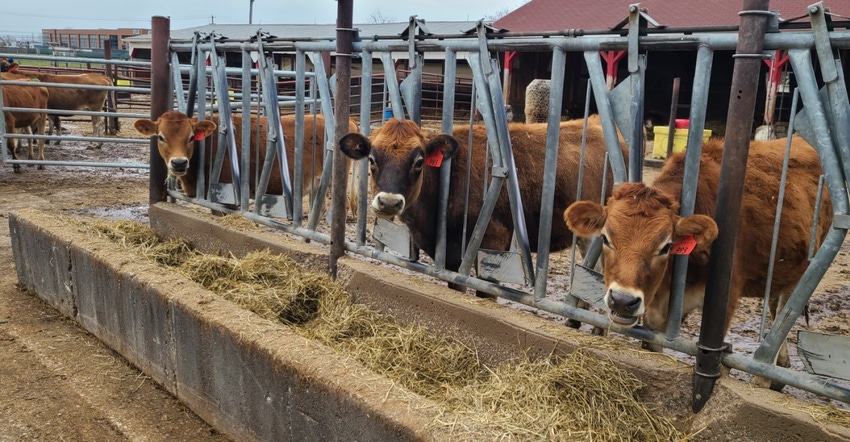
The United States has prevailed in the first dispute settlement panel proceeding ever brought under the United States-Mexico-Canada Agreement. A USMCA panel agreed with the United States that Canada is breaching its USMCA commitments by reserving most of the in-quota quantity in its dairy tariff-rate quotas for the exclusive use of Canadian processors.
“This historic win will help eliminate unjustified trade restrictions on American dairy products and will ensure that the U.S. dairy industry and its workers get the full benefit of the USMCA to market and sell U.S. products to Canadian consumers,” says U.S. Trade Representative Ambassador Katherine Tai.
The United States requested that a panel be established on May 25, 2021 under Chapter 31 of the USMCA. The panel issued its final report to the parties on December 20, 2021. Under USMCA rules, Canada has 45 days from the date of the final report to comply with the panel’s findings.
From January through October 2021, the United States exported $478 million of dairy products to Canada, which is the third largest export destination for U.S. dairy products.
A tariff-rate quota applies a preferential rate of duty to an “in-quota” quantity of imports and a different rate to imports above that in-quota quantity. Under the USMCA, Canada has the right to maintain 14 TRQs on the following dairy products: milk, cream, skim milk powder, butter and cream powder, industrial cheeses, cheeses of all types, milk powders, concentrated or condensed milk, yogurt and buttermilk, powdered buttermilk, whey powder, products consisting of natural milk constituents, ice cream and ice cream mixes, and other dairy.
TRQs are a system of tariffs negotiated between countries that allow a predetermined quantity of imports at a specified tariff rate, where that rate is often at or near zero. Any additional imports above that predetermined quantity are subject to significantly higher tariffs. In the case of U.S. dairy products, these additional Canadian tariffs typically price U.S. dairy products out of Canada’s market, making fair access to Canadian dairy TRQs vital to maximizing exports to that market.
In notices to importers that Canada published in June and October 2020 and May 2021 for dairy TRQs, Canada set aside and reserved a percentage of the quota for processors and for so-called “further processors,” contrary to Canada’s USMCA commitments.
Dairy industry applauds USMCA ruling
The dairy industry praised the ruling, saying it is an important victory for U.S. dairy farmers and the millions of jobs tied to the U.S. dairy industry.
“The United States and Canada negotiated specific market access terms covering a wide variety of dairy products, but instead of playing by those mutually agreed upon rules, Canada ignored its commitments. As a result, U.S. dairy farmers and exporters have been unable to make full use of USMCA’s benefits,” says Jim Mulhern, president and CEO of the National Milk Producers Federation.
Brody Stapel, president of one of the largest dairy coops in the country Edge Dairy Farmer Cooperative, says when USMCA’s predecessor the North American Free Trade Agreement was renegotiated and USMCA was implemented, dairy farmers were hopeful that the new agreement would bring opportunities to its members.
“But that is only possible if both sides play be the rules,” Stapel explains. “We are pleased to see that dispute settlement mechanisms put in place through the agreement are working, and hope that our trusted trading partner and neighbor will right the ship and come into compliance.”
Canada has until February 3, 2022 to respond to the panel’s findings and make its TRQ regulations consistent with USMCA. Krysta Harden, president and CEO of the U.S. Dairy Export Council, says she expects Canada to abide by its trade commitments so that the American dairy industry can fully access the Canadian markets just as USMCA promised.
“While this is an essential victory, it is one step in a much longer journey,” Harden says. “Our work to uphold the full benefits of USMCA continues, as we strive to reduce supply chain disruptions for our exports and ensure Mexico’s adherence to the dairy provisions of the USMCA, among other key matters.”
The announcement comes as welcome news to global dairy associations that support Canada being held to its international obligations and commitments. The International Dairy Foods Association, the International Cheese Council of Canada, the Dairy Companies Association of New Zealand and Eucolait applauded the findings. As major dairy-producing regions, the respective industries of the United States, New Zealand, and the European Union, as well as Canadian importers have each highlighted concerns with Canada’s import policies for dairy products, including Canada’s skewed TRQ administration that fails to provide equal opportunities to all importers.
“The ICCC welcomes the panel’s findings and looks forward to Canada living up to all the obligations it has committed to in the USMCA” says Patrick Pelliccione, chairman of the International Cheese Council of Canada. “Our members and associate members – small and medium-sized Canadian enterprises – look forward to TRQ policies that will ultimately reduce costs for Canadian consumers, deliver the stability and fairness that has been lacking in the existing system and allow importers to continue providing Canadians’ favorite cheeses at affordable prices.”
Global dairy industry associations are also awaiting the outcomes of Canada’s TRQ administration and allocation review, started in 2019, which has been on hold since early 2020.
About the Author(s)
You May Also Like






